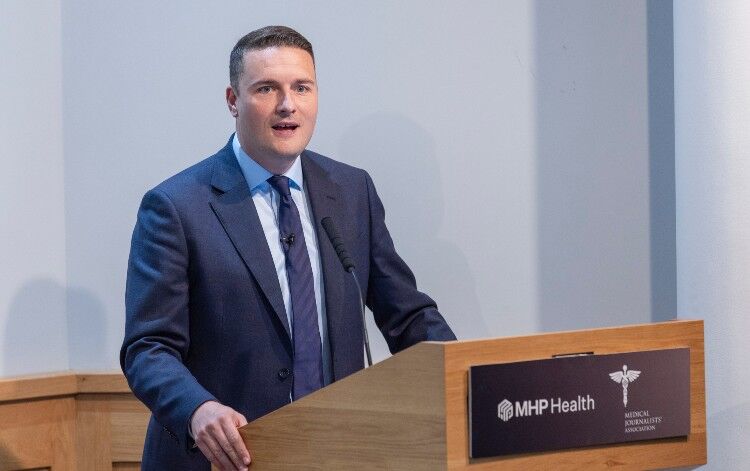The Labour Party will increase spending on primary care and partner with private providers and industry as part of its NHS reforms if elected to government, the shadow health secretary has suggested.
Speaking at a Medical Journalists' Association event week Wes Streeting said that while Labour’s plans had been ‘careful’ in terms of costing, he pledged to ‘reform our public services to get out more for what we put in’.
As part of this, the Labour health secretary added: ‘Primary care as a proportion of the NHS budget ought to increase.’
He said this would be ‘better for patients and also better value for taxpayers’.
‘Primary care generally, [and] general practice specifically, has a lot to look forward to if there is a Labour government after the next general election,’ he added.
Mr Streeting also invited a culture of ‘mutual accountability’ with NHS leaders, including within primary care.
‘If nothing changes after the first term of the Labour government, then we're in big trouble,’ he said, having described the NHS as ‘a hospital-based service when patients want to be able to see their GP and stay in their own home’ and ‘a sickness service that doesn't do enough to keep people well’.
‘Growth is Labour's number one priority,’ Mr Streeting said. ‘I see the NHS as one of the engines of growth for our country's economy.’
And he promised ‘immediate solutions’ to hospital discharge delays and corridor care by making use of private social care partners.
‘The NHS can't do it alone. The public sector has limits,’ he said.
Mr Streeting also pledged to work with life sciences and the pharmaceutical industry, saying: ‘The only way out of this crisis in the NHS is to recognise that fact, it is only by partnering with our life sciences sector, that the NHS can develop the medicines of the future and put NHS patients at the front of the queue for new treatments.’
And he highlighted the importance of interoperable IT systems and the potential of shared data systems.
‘Patients ultimately care about two things. Is my data being held securely? Is it being used ethically? And as long as the answer to both of those questions is "yes", patients are surprised that if they're knocked down by a bus, and they’re blue-lighted to an A&E, that the people treating them do not have a full account of their patient record,’ he said.
Mr Streeting also said that improved data systems had the potential to make sure patients ‘get the very best personalised care’, as well as offering opportunities for targeted clinical trial recruitment.
He added that in this regard the ‘culture of innovation’ has been ‘too pedestrian’ between the life sciences sector and the NHS.
And he pledged to reform the NHS’ relationships with the life sciences sector, to make partnership more attractive to industry and get better medicines value for the NHS.
While he suggested he was in generally in favour of locally devolved decision making, he said that ‘especially on things like procurement’ there was ‘a very obvious cost benefit in terms of doing more centrally’.
The Labour health secretary added: ‘There's been a consistent deafening chorus of unanimous opinion, from your smallest med tech start-up entrepreneur, through to some of the biggest names in pharma, that the NHS is not a good partner.
‘We do not realise anywhere near to full potential the benefits of having a single payer system. That ought to make it really easy to partner with life sciences in terms of clinical trials, to test and trial, new treatments, new technology, to prove the concept with a diverse cohort of patients.
‘And then having proven that concept, adopt and roll it out on a scale that means that they get a good volume of sales and we get a good value on price. And make the UK a global destination for that kind of groundbreaking science, and potentially a stronger destination in terms of manufacturing too.’
Alongside Labour's manifesto promising a Community Pharmacist Prescribing Service; the Liberal Democrats have pledged to 'work towards a fairer and more sustainable long-term funding model for pharmacies'; the Conservatives set out increased spending plans for Pharmacy First, Green MPs will work towards making HIV prevention pill PrEP (Pre-Exposure Prophylaxis) available from community pharmacies; and Reform UK has pledged a policy of ‘Pharmacy First, GP Second, A&E Last’, with tax incentives for pharmacies in a bid to ease the burden on urgent and emergency NHS care.


Have your say
Please add your comment in the box below. You can include links, but HTML is not permitted. Please note that comments are not moderated before publication and the views expressed are those of the user and do not reflect the views of The Pharmacist. Remember that submission of comments is governed by our Terms and Conditions. You can also read our full guidelines on article comments here – but please be aware that you are legally liable for any libellous or offensive comments that you make. If you have a complaint about a comment or are concerned that a comment breaches our terms and conditions, please use the ‘Report this comment’ function to alert our web team.